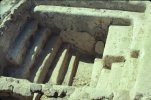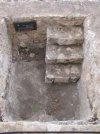My Bible study group is going through John verse by verse and recently encountered these two at our last meeting.
We had a hard time understanding why John 3:22 states Jesus was baptizing but then John 4:2 corrects it and says He Himself wasn’t baptizing.
I think we understand that He didn’t actually baptize anyone but was present for His disciples to baptize but why isn’t 3:22 clearer on that point? They really do seem to contradict so could it possibly be a translation issue? Or maybe John wrote 3:22 then decided to clarify in 4:2 rather than change 3:22?
We had a hard time understanding why John 3:22 states Jesus was baptizing but then John 4:2 corrects it and says He Himself wasn’t baptizing.
I think we understand that He didn’t actually baptize anyone but was present for His disciples to baptize but why isn’t 3:22 clearer on that point? They really do seem to contradict so could it possibly be a translation issue? Or maybe John wrote 3:22 then decided to clarify in 4:2 rather than change 3:22?



